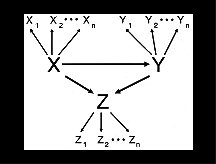 Photo Caption and Credits
Photo Caption and Credits
Increasingly, historians study the past using statistical techniques. Often such analysis is accomplished using electronic computers. In public and professional life and in society in general, we as citizens are frequently presented with arguments and debates concerning policy and choices. As voters and consumers we are bombarded with statistical information, often in misleading ways. This course is an introduction to statistics as used by historians, with nearly all historical examples being drawn from articles and books written by currently active historians. The historical questions examined range over a period of several centuries. We will examine some exciting historical data bases using modern Unix computer graphics work stations.
COURSE FORMAT: Laboratory (computer) Lecture
Level: UG Credit: 1.00 Gen Ed Area & Dept: SBS HIST
Prerequisites: None
Last Updated on MAR-10-1997
Causal diagram of a multiequation model with latent variables.
Jarausch, Konrad, QUANTITATIVE METHODS FOR HISTORIANS: A GUIDE TO RESEARCH, DATA AND STATISTICS, North Carolina: The University of North Carolina Press, 1991
Copyright Wesleyan University, Middletown, Connecticut, 06459